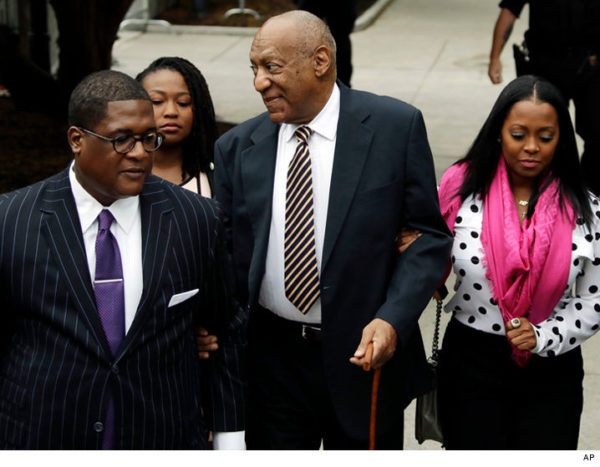
Disgraced television icon Bill Cosby was convicted Thursday of sexual assault by a US jury — losing a year-long legal battle that was made tougher at retrial as the first celebrity trial of the #MeToo era.
The frail 80-year-old Cosby — once beloved as “America’s Dad” — could now spend the rest of his life behind bars when he is sentenced for drugging and molesting Andrea Constand at his Philadelphia mansion in January 2004.
His lawyer vowed that the battle is not over as he would appeal.
‘I’m the happiest I’ve ever been about any court decision in 42 years,’ said lawyer Gloria Allred, who represents 33 Cosby accusers.
Constand was in the packed courtroom in Norristown, just outside Philadelphia, as the verdict was read out to stifled sobs in the gallery.
A criminal conviction and possible prison term is a devastating final chapter in the career of the once towering figure in late 20th century American popular culture, the first black actor to grace primetime US television, who hit the big time after growing up as the son of a maid.
The jury, which deliberated for more than 14 hours over two days, found him guilty on all three counts of aggravated indecent assault. Cosby’s first trial ended in June last year with a hung jury.
The three counts constituted penetration without Constand’s consent, which took place both while she was unconscious and after she had been drugged. Each count carries a maximum penalty of 10 years.
The pioneering African American actor and entertainer, adored by millions for his seminal role on “The Cosby Show,” sat in silence as the jury foreperson read out the verdict.
But after the jury was led out, the Emmy winner — dogged for years by allegations of similar assaults made by dozens of women — erupted in an expletive-laden tirade as prosecutors argued he was a flight risk.
The verdict was a vindication for the prosecution, after Cosby’s first trial ended with the sequestered jurors hopelessly deadlocked after 52 hours of deliberations.
It also ended a winning streak for Los Angeles lawyer Tom Mesereau, who leapt to fame for getting Michael Jackson acquitted of child molestation in 2005, but who ultimately failed to deliver for Cosby.
A case with no physical evidence, the trial essentially boiled down to he-said, she-said, hinging on how credible the jury found 45-year-old Constand, a former basketball player turned massage therapist.
The Canadian woman said she went to Cosby’s home to discuss her impending resignation as director of operations for women’s basketball at Temple University, where he was on the board of trustees.
The actor offered her three blue pills to “help take the edge off,” which she took believing they were a natural remedy.
“I trusted him,” Constand said. But within minutes, she developed double vision, started slurring her words and lost consciousness.
When she came to, she said Cosby was penetrating her vagina with his fingers, groping her breasts and making her masturbate him.
“I was limp and I could not fight him off,” she said.
When Constand first reported the assault, the district attorney at the time initially refused to press charges.
Prosecutors reopened the case in 2015, nearly a decade after she signed a $3.4 million settlement with Cosby in 2006, claiming that new evidence had come to light just as other accusers came forward.
Around 60 women, many of them onetime aspiring actresses and models, came forward publicly to brand him a calculating, serial predator who plied victims with sedatives and alcohol to bed them over four decades.
Crucial to the second trial was Judge Steven O’Neill’s decision to let five other women testify how Cosby had preyed on them in a similar manner, to demonstrate “common plan, scheme or design.”
– ‘Inability to consent’ –
Prosecutors said Cosby used his fame to gain the trust of unsuspecting women, time and time again, and deliberately drugged Constand so that she would be unable to resist his advances.
“This case is about trust, betrayal and the inability to consent,” Kristen Feden told jurors, tearing into the defense’s “vicious” and “filthy” character assassination attempts against Cosby’s accusers.
She turned on its head the defense claim that Constand was a con artist, who pursued a grieving father mourning his son’s murder and old enough to be her grandfather for a big payout.
“The perpetrator of that con?” shouted Feden in dramatic and emotional closing remarks. “That man!” she shouted, pointing at Cosby.
Mesereau and former federal prosecutor Kathleen Bliss sought an aggressive defence that portrayed Constand as a money-grabbing opportunist, who lied to extricate herself from financial worries.
“You’re dealing with a pathological liar,” said Mesereau, branding the 2006 settlement “one of the biggest highway robberies of all time.”
But ultimately, the panel of five women and seven men were unconvinced.
Hanging over the entire trial was the cultural watershed of the #MeToo movement, which since last October has seen a litany of powerful men from Harvey Weinstein to Kevin Spacey lose their careers.
Experts had suggested that changing attitudes towards sexual assault could make jurors more inclined to believe female victims




Hello!
With a constantly evolving selection of games, boredom is never an option. Dive in daily to explore new adventures and seize every opportunity! https://spiritredirect.com/d8ee9ac13
Профессиональный сервисный центр по ремонту бытовой техники с выездом на дом.
Мы предлагаем:ремонт бытовой техники в мск
Наши мастера оперативно устранят неисправности вашего устройства в сервисе или с выездом на дом!
Профессиональный сервисный центр по ремонту техники в Краснодаре.
Мы предлагаем: Сколько стоит отремонтировать электросамокат ZAXBOARD
Наши мастера оперативно устранят неисправности вашего устройства в сервисе или с выездом на дом!
Предлагаем услуги профессиональных инженеров офицальной мастерской.
Еслли вы искали срочный ремонт холодильников gorenje, можете посмотреть на сайте: ремонт холодильников gorenje рядом
Наши мастера оперативно устранят неисправности вашего устройства в сервисе или с выездом на дом!
Если ищете качественную информацию и полезные сервисы – есть отличное решение!
Обязательно посмотрите раздел: Исчезающие виды
На портале собрано всё необходимое: статьи, новости, справочники, онлайн-инструменты. Экономит много времени на поиске нужной информации!
Рекомендую отличный ресурс для поиска полезной информации на любые темы!
Особенно интересна статья: Житие средневекового рыцаря
На сайте есть удобные калькуляторы, сервисы и актуальные новости. Присоединяйтесь к сообществу активных пользователей!
Профессиональный сервисный центр по ремонту техники.
Мы предлагаем: Ремонт парогенераторов Hyundai во Владимире
Наши мастера оперативно устранят неисправности вашего устройства в сервисе или с выездом на дом!
Thank you…
Click to child porn sites http://www.konyadakihurdaci.com/ child porn tube videos credi,t card.
Restoration Marketing Pros 104 Main St Bloomsburg, PA 17815 (904) 657-4138 Your go to pros for exclusive restoration leads Arnold Baker Founder Of Restoration Marketing Pros – Generating exclusive, hyper targeted water damage leads (live calls) for over a decade! The Ultimate Guide to Exclusive Water Damage Restoration Leads Wondering why your phone is not ringing with the right kind of water damage calls? A restoration business lives or dies based on how many good, qualified water damage leads it receives each week. If customers are not reaching out when pipes burst and basements flood, your technicians stay home and your revenue flatlines. That is why so many restoration business owners look for reliable ways to buy or generate water damage leads. The hard truth is that a lot of popular lead generation channels for restoration work are designed to benefit the platform, not the contractor. Shared-lead platforms blast the same desperate homeowner’s information to multiple contractors in your local area. The moment that happens, the conversation shifts away from quality and toward who is willing to shave the most off their invoice. The better approach is to focus on exclusive water damage leads that are never shared with other contractors. Exclusive leads are single-recipient inquiries, which means you are the only one calling that homeowner back. In practical terms, exclusive leads allow you to charge what the job is actually worth and still win more often. Among all types of leads, live transfer calls are the highest-intent for restoration work. A live transfer is a pre-qualified homeowner or property manager on the phone right now, actively looking for help. Instead of chasing web forms, you are answering calls from people who want to book service as soon as possible. Speed matters more in restoration than in almost any other local service industry. A homeowner with a burst pipe is not spending the weekend comparing quotes; they are frantically searching for someone to solve the problem right now. Because of this timing, live transfers convert into booked jobs at a much higher rate than cold or shared leads. To consistently generate those kinds of leads, you need the right marketing and lead generation partner or system. Many agencies lump restoration in with roofers, plumbers, or HVAC companies and completely miss the urgency factor. You should look for a team or platform that lives and breathes property damage restoration marketing. Alongside any paid lead source, it is smart to build internal marketing assets that you control. SEO is what gets your website in front of people who are actively Googling emergency water damage help in your area. With PPC and LSA, you can appear at the very top of Google and generate emergency calls almost immediately. Strong Google reviews and testimonials are often the deciding factor when a homeowner chooses which restoration company to contact. When you combine exclusive leads, smart paid ads, strong SEO, and great reviews, you build a powerful client acquisition engine. You move from reactive and uncertain to proactive and in control of your pipeline. This is how serious restoration contractors grow from a small local outfit into a dominant, high-revenue operation.